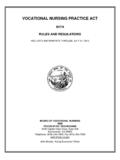Transcription of Working with Vocational Rehabilitation (VR)
1 COPYRIGHT 2016 by Disability Rights NC. All rights reserved. This document contains general information for educational purposes and should not be construed as legal advice. It is not intended to be a comprehensive statement of the law and may not reflect recent legal developments. If you have specific questions concerning any matter contained in this document or need legal advice, we encourage you to consult with an attorney. Working with Vocational Rehabilitation (VR) This packet contains information about: 1. the North Carolina VR program; 2. how to request VR goods and services; 3. available VR goods and services; and 4. your VR rights. To help you make the most of your VR services, this packet also includes: 5. tips for being a good advocate for yourself in the VR process; 6. information about appealing VR decisions you do not agree with and sample letters you may use in making your appeal; 7. a checklist to help you stay on track with the VR process; 8.
2 A chart of all the available VR goods and services; and 9. contact information for each VR office. The North Carolina Vocational Rehabilitation (VR) Program The VR program provides goods and services to help people with disabilities get jobs and support themselves. Depending on your interests, VR can help you prepare for work, get a job, keep your job, get your job back, earn higher pay or get promotions in your current job. Any job you get with the help of VR must pay you at least a minimum wage and be in a workplace that includes coworkers without disabilities. In North Carolina, the VR program is run by the Division of Vocational Rehabilitation Services (DVRS) and the Division of Services for the Blind (DSB). People who have significant visual impairments can choose to receive VR services through either DVRS or DSB, while all other people with disabilities receive VR services through DVRS. EM-02 Working with VR 2016 Disability Rights NC 2 North Carolina has no waitlist for the VR program.
3 This means that anyone who has a disability that impacts their ability to work can go through the program at this time. Even though there is no waitlist, it can still take several months after you contact your local VR office before you start receiving goods and services. It takes a while for VR to determine if you are eligible for the program and to create an individualized plan for employment (IPE) for you. Once your work plan is complete, you will begin receiving the goods and services laid out in your plan. TIP: Once you start the VR process, stay in regular contact with your VR counselor. It will keep you and your goals fresh in his or her mind. You also want to stay in touch with your counselor to make sure he or she is meeting their time limits to provide you with services. For example, your counselor has: 21 days to start the application process after you are referred to the local VR office; 60 days to determine if you are eligible for the VR program after the application is started; and 90 days to complete your plan after you are found eligible for VR services.
4 If your counselor is not meeting these time limits, do not agree to extend them unless the counselor properly documents the reason for the delay. TIP: Remember to treat your VR counselor with as much respect as you expect him or her to give to you. If you have an appointment scheduled with your counselor or VR provider, don t miss it. If you can t make a meeting or appointment, give as much notice as you can that you can t make the meeting or appointment and reschedule it as soon as possible. How to Request VR Goods and Services STEP 1 REFERRAL AND APPLICATION The first step in getting VR services is a referral to the local DVRS or DSB office. (A list of all offices is included at the end of this packet.) You or any other person can refer you to VR. If you are referred to VR by someone other than you, the VR office will probably follow up with you to make sure you actually want their help. After confirming that you want to work with VR, the local VR office will help you begin your application.
5 It should take no more than 21 days to begin the application process. EM-02 Working with VR 2016 Disability Rights NC 3 STEP 2 BECOMING ELIGIBLE FOR VR GOODS AND SERVICES After the application is complete, VR has 60 days to decide if you are eligible for VR services. VR may order an evaluation of you to decide if you will benefit from VR services. All evaluations should be done in settings that include people without disabilities whenever possible. If you receive SSI or SSDI benefits, VR assumes that you will benefit from its services and should start developing your plan right away. If VR is concerned that you will not benefit from its services, you must be allowed to have trial work experiences to show that you can work with the right supports. These work experiences must be varied, take place in settings that include people without disabilities, and last long enough to understand your work potential. VR must provide you whatever supports you need, such as sign language interpretation or assistive communication devices, during any evaluation or trial work experience.
6 If VR finds that you are not eligible for VR services, VR must inform you in writing and give you the reason for its decision. There are three main reasons why people are not found eligible: 1. They do not have a disability that limits their ability to work. 2. They do not need VR services to prepare for work, get work, stay on the job, get a job back, or advance in employment. 3. Their disability is so severe that they cannot benefit from VR services. Please note that you must be a resident of North Carolina to be eligible for North Carolina VR services. If you are not a resident of North Carolina, you may request services from the VR program in the State where you are a resident. TIP: VR must meet a very high standard to prove that you are not eligible for services. If you are told you are not eligible for VR services, you may appeal the decision. Many people can successfully appeal this decision. The section on appealing decisions you don t agree with has information on how you can appeal.
7 STEP 3 INDIVIDUALIZED PLAN FOR EMPLOYMENT (IPE) A VR counselor should begin creating a plan for you as soon as possible, but no more than 90 days after you were found eligible. The only time your plan should take more than 90 days to be put together is if you agree to give your counselor more time, and agree to a specific date on which your plan will be finished. Extending the deadline should only happen when you need to extend the deadline, not for the convenience of your VR counselor. EM-02 Working with VR 2016 Disability Rights NC 4 The VR program must help you get a job in your community making at least a minimum wage. The plan should address your individual work needs. It must identify your strengths, resources, priorities, concerns, abilities, capabilities, and interests as they relate to work. The VR counselor may gather this information by reviewing your existing records, talking with people who are familiar with your work abilities and capabilities, and evaluating your work skills and work needs in real life settings.
8 The VR counselor should use the information he or she has gathered to help you choose the employment goal for your work plan and choose what goods and services you will need to achieve your employment goal. Your employment goal may include finding a job in the community, becoming self-employed, retaining or regaining a job, or advancing to a better job. Once the work plan is completed and signed, the goods and services included in your plan will begin. TIP: You have the right to change your employment plan, or refuse to sign it if you don t agree with the employment plan. For example, you might refuse to sign your plan if it does not include all the goods and services you need, if you are unhappy with the goods and services you are receiving, if you would like to change your service provider or service setting, or if you would like to change your employment goal. If you end up in a disagreement with your counselor over your employment plan, you can challenge their decision.
9 See the section on standing up for your rights for instructions on how to do so. Available VR Goods and Services There are a number of different goods and services that VR can provide if needed to help you achieve your employment goal. Some goods and services are called core goods and services, while others are called support goods and services. You must choose at least one core good or service in order to receive support goods and services. Core goods and services include counseling and guidance, diagnosis and treatment of a medical or physical impairment, job training, job related services, and Rehabilitation technology. TIP: Requesting Other Goods and Services. A chart of VR goods and services can be found at the end of this packet. Even if a good or service is not listed, you may request it as part of your individualized employment plan so long as it is necessary for the success of your employment goal. VR may not place a fixed dollar limit on a good or service or the total amount of goods and services you can receive.
10 VR counselors, however, are limited in the cost of goods and services they can individually approve. If you request a good or service that costs more than what your VR counselor can approve, the VR chief of policy will have to approve the purchase. EM-02 Working with VR 2016 Disability Rights NC 5 Before providing you with goods and services, your VR counselor must check and see if someone else can pay for them. For example, people who are eligible for employment services through Medicaid may not be able to get those same goods and services through VR. VR is not permitted to check if someone else would pay for a good or service if it would interrupt or delay your progress toward completing your employment goal, interrupt or delay a job placement for you, or a medical professional has determined that stopping the good or service is an extreme medical risk to you. TIP: Services that do not require a search for comparable goods and services include: assessments counseling and guidance referrals to other agencies job-search assistance job placement job-retention services follow-up services follow-along services VR will consider your ability to pay for goods and services when making decisions about the goods and services it will provide.






